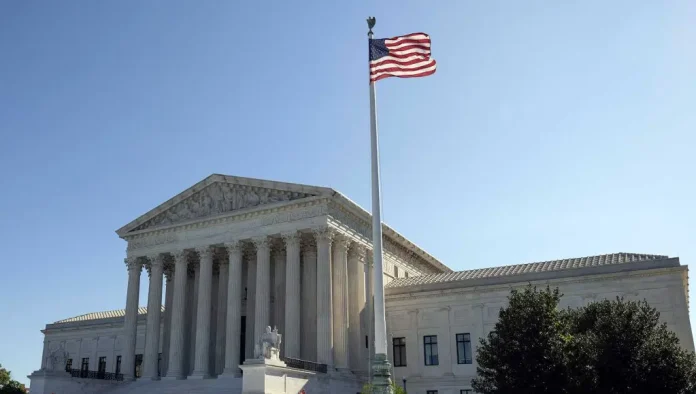On Friday, the Supreme Court issued a 6-3 decision along ideological lines against a California woman who claimed her rights were infringed when federal officials denied her husband entry into the country, citing interpretations of his tattoos.
The ruling concluded that citizens do not inherently possess the right to be involved in federal government determinations regarding the lawful residency of immigrant spouses in the United States.
“While Congress has made it easier for spouses to immigrate, it has never made spousal immigration a matter of right,” said Justice Amy Coney Barrett, reading from the bench the majority opinion joined by her fellow conservatives.
Justice Barrett emphasized that while citizens have a fundamental right to marriage, it is erroneous to infer from this right a broader entitlement that could restrict Congress’s authority to determine the admission or exclusion of foreigners into the United States.
In a dissent joined by her liberal colleagues, Justice Sonia Sotomayor argued that denying citizens the ability to seek specific reasons for the denial of entry to their spouses “significantly diminishes the importance of the right to marriage within the immigration context.”
The majority ruled against Los Angeles civil rights attorney Sandra Muñoz, who has been separated from her Salvadoran husband for nearly a decade. The couple initiated the process of obtaining an immigrant visa after their marriage in 2010. Luis Asencio-Cordero, who had been residing in the US without legal status, traveled to the consulate in San Salvador to complete the visa process.
However, his application was denied by a consular officer who cited a law barring entry to individuals who might engage in unlawful activities. The State Department declined to provide a more specific explanation, but through a lawsuit, Muñoz discovered that the denial was partly based on the consular officer’s belief that Asencio-Cordero’s tattoos indicated affiliation with the MS-13 gang.
Asencio-Cordero has denied any association with gangs and has no criminal record. His tattoos, which include symbols like Our Lady of Guadalupe, theatrical masks, and a portrait of psychologist Sigmund Freud, were described by his lawyers as expressions of his intellectual interests and Catholic faith.
The US Court of Appeals for the 9th Circuit sided with Muñoz, ordering the State Department to disclose the reason for denial and reconsider the visa application. However, this decision was overturned by the Supreme Court following an appeal by the State Department.












